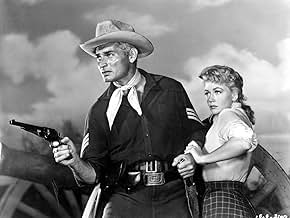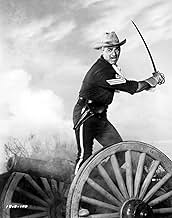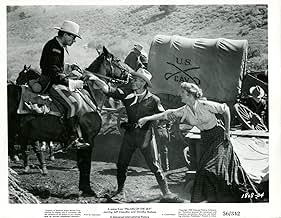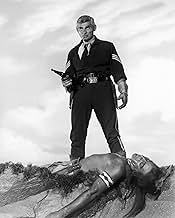AVALIAÇÃO DA IMDb
6,2/10
833
SUA AVALIAÇÃO
Adicionar um enredo no seu idiomaIn 1868 Oregon, after the Army violates the treaty by building a road across the reservation, several tribal chiefs decide to unite their forces against the trespassing whites.In 1868 Oregon, after the Army violates the treaty by building a road across the reservation, several tribal chiefs decide to unite their forces against the trespassing whites.In 1868 Oregon, after the Army violates the treaty by building a road across the reservation, several tribal chiefs decide to unite their forces against the trespassing whites.
- Direção
- Roteiristas
- Elenco e equipe completos
- Produção, bilheteria e muito mais no IMDbPro
Avaliações em destaque
Slow-paced story gets off to a ponderous start with too much talk and too little action, with only some gorgeous scenery for eye comfort. The fault seems to be George Marshall's sluggish direction of a uniformly bland cast.
All of the actors go through their paces in rather standard roles, including JEFF CHANDLER, KEITH ANDES, WARD BOND and LEE MARVIN and for a western that promises some action when the plot thickens, it's a good half-hour before the conflict between cavalry and Indians provides any thrills.
DOROTHY MALONE has the only substantial female role, as a woman no longer in love with her husband. In make-up and hairstyle, she looks and acts more as though she's a woman of modern times rather than frontier days. The romantic triangle (Malone, Chandler, Andes) is a weak one.
The big set piece is the Indian attack that occurs an hour into the film and wipes out most of the command. It's well staged and vigorously mounted for western action. But it comes too late to alter the slow pacing of most of the story which is either Marshall's or the scriptwriter's fault.
A minor quibble: All of the night scenes have a soundstage look to them, in sharp contrast to all the daytime locations.
Summing up: Lackluster western needed the John Ford touch from George Marshall, with Lee Marvin and his Irish accent less than credible in the sort of supporting role Victor McLaglen usually played. Nothing more than average.
All of the actors go through their paces in rather standard roles, including JEFF CHANDLER, KEITH ANDES, WARD BOND and LEE MARVIN and for a western that promises some action when the plot thickens, it's a good half-hour before the conflict between cavalry and Indians provides any thrills.
DOROTHY MALONE has the only substantial female role, as a woman no longer in love with her husband. In make-up and hairstyle, she looks and acts more as though she's a woman of modern times rather than frontier days. The romantic triangle (Malone, Chandler, Andes) is a weak one.
The big set piece is the Indian attack that occurs an hour into the film and wipes out most of the command. It's well staged and vigorously mounted for western action. But it comes too late to alter the slow pacing of most of the story which is either Marshall's or the scriptwriter's fault.
A minor quibble: All of the night scenes have a soundstage look to them, in sharp contrast to all the daytime locations.
Summing up: Lackluster western needed the John Ford touch from George Marshall, with Lee Marvin and his Irish accent less than credible in the sort of supporting role Victor McLaglen usually played. Nothing more than average.
This fine western is a cavalry-Indian affair that has the usual treaty-breaking by the government as it builds a road and fort on Indian land that causes an uproar and leads to war. The military's action sets in motion cavalry-Indian hostilities and the tribes gather for an attack on the fort. Many of the Indians have been baptised and converted to Christianity by a white missionary and live in peace with the soldiers, many serving as scouts under a sergeant played by Jeff Chandler. Complicating matters are two white women the Indians hold as hostages who are at great risk should war break out. Chandler did some his best work in westerns and is the lieutenant whom the Indian soldiers respect and follow faithfully. Chandler's flirtation with a married woman, played by Dorothy Malone, doesn't have much to do with the story other than to give the leading man a romantic interest. Ward Bond, Michael Ansara and Keith Andes are good in supporting roles. Oregon's scenic beauty is on display in this CinemaScope film.
A rather sombre film for veteran director George Marshall, set in Oregon in 1868.
In a well-acted film, Ward Bond is particularly good in a sympathetic role as a preacher; and even Lee Marvin is permitted a touching scene as one of the troop.
In a well-acted film, Ward Bond is particularly good in a sympathetic role as a preacher; and even Lee Marvin is permitted a touching scene as one of the troop.
Given the basically no-star cast and the fact that it came from Universal-International, it's understandable that you might think this would be just another run-of-the-mill "B" oater--and you'd be dead wrong. This first-rate western has several things going for it. The breathtaking Oregon locations have been beautifully captured by Harold Lipstein's expert Technicolor cinematography. The colors are lush, and the photography is so atmospheric you can almost feel the chill in your bones as the troops slog through the rugged mountain country. There are several rousingly staged and exciting action scenes, notably a somewhat lengthy sequence in which a wagon train loaded with troops cuts its way through a mass of charging Indians. The performances by a cast of veteran character actors--Lee Marvin in an early role (although his Irish brogue is a bit much), Keith Andes, Charles Horvath, Alberto Morin and Willis Bouchey, among others--are top-notch, Dorothy Malone is beautiful, Jeff Chandler gives a more authoritative (and animated) performance than he usually did and Ward Bond does an outstanding job as a caring and concerned missionary who doesn't want to see bloodshed on either side. The main thing the film has going for it, though, is the subject matter. Rather than having the usual Apaches or Comanches rampaging through the Southwest, the film is set in the Oregon mountain country, and the Indians are not superstitious savages but have been converted to Christianity by missionary Bond, and many in their religious zeal have given up their "animal" names and taken the names of Biblical figures (to further drive the point home, one soldier complains to Bond that, since he has "Christianized" the Indians, they have no qualms about attacking at night; "uncivilized" Indians never attacked at night for fear that if they were killed, their spirits would roam in the dark forever and never find peace). As far as I know, this particular facet of the Indian wars had never been tackled before or, for that matter, since. The story consistently holds your interest (although the triangle between Chandler, Malone and Andes tends to slow things down somewhat), the action scenes are terrific, the photography, as noted, is superb. A very worthy effort from veteran director George Marshall. Well worth your time.
I am not a huge fan of westerns but from time to time I don't mind watching some on TV. The problem is that most of the time the plots are all very similar... originality is not a trademark of the genre. Yet PILLARS OF THE SKY was a bit different. Let's see why.
In 1868 Oregon various Indian tribes are confined in a reserve built by Doctor Holden (Ward Bond) and Sergeant Emmet Bell (Jeff Chandler) has to make sure that there is always peace. However, some transfert of US Army Weapons makes chief Kamiakin (Michael Ansara) very suspicious and they attack the Army. Unfortunately appeals for a truce don't work, and after Kamiakin is killed by one of his own the other chiefs and Bell will do whatever is necessary for keeping the peace.
The acting was very good for a Western. Jeff Chandler was very good and believable as an Army Sergeant that is very concerned about keeping the peace between the Army and the Indians. Dorothy Malone gives a great performance other than still looking gorgeous, and the cast is chock full of many familiar faces of those years: Martin Milner, Lee Marvin, Willis Bouchey, Philip Carey and a scene-stealing Michael Ansara are all pretty entertaining. The Oregon scenery was great and makes you want to go on vacation there, and the soundtrack fit the movie's spirit very well.
If you are a die hard western fan don't miss it if you haven't seen it, but for those who watch them from time to time it's solid and entertaining... what more you can ask?
In 1868 Oregon various Indian tribes are confined in a reserve built by Doctor Holden (Ward Bond) and Sergeant Emmet Bell (Jeff Chandler) has to make sure that there is always peace. However, some transfert of US Army Weapons makes chief Kamiakin (Michael Ansara) very suspicious and they attack the Army. Unfortunately appeals for a truce don't work, and after Kamiakin is killed by one of his own the other chiefs and Bell will do whatever is necessary for keeping the peace.
The acting was very good for a Western. Jeff Chandler was very good and believable as an Army Sergeant that is very concerned about keeping the peace between the Army and the Indians. Dorothy Malone gives a great performance other than still looking gorgeous, and the cast is chock full of many familiar faces of those years: Martin Milner, Lee Marvin, Willis Bouchey, Philip Carey and a scene-stealing Michael Ansara are all pretty entertaining. The Oregon scenery was great and makes you want to go on vacation there, and the soundtrack fit the movie's spirit very well.
If you are a die hard western fan don't miss it if you haven't seen it, but for those who watch them from time to time it's solid and entertaining... what more you can ask?
Você sabia?
- CuriosidadesBetween takes, Ward Bond argued with Lee Marvin that the US should attack the Soviet Union because of what Bond claimed to be the Communist threat. Marvin, an ex-Marine who served in World War II, was wounded in the fighting on Saipan against the Japanese,. He asked Bond--who had never spent a day in the military due to epilepsy, --how he spent the war. Bond had no real reply, and Marvin pointed out that the only thing Bond knew about war was what he pretended to fight on studio back lots.
- Erros de gravaçãoThe cavalry had a Red Cross wagon. The American Red Cross was not founded until 1881.
- Trilhas sonorasBugle Calls
(uncredited)
Composer unknown
Principais escolhas
Faça login para avaliar e ver a lista de recomendações personalizadas
Detalhes
Bilheteria
- Faturamento bruto nos EUA e Canadá
- US$ 1.500.000
- Tempo de duração
- 1 h 35 min(95 min)
- Proporção
- 2.35 : 1
Contribua para esta página
Sugerir uma alteração ou adicionar conteúdo ausente







































